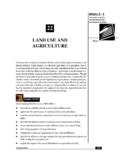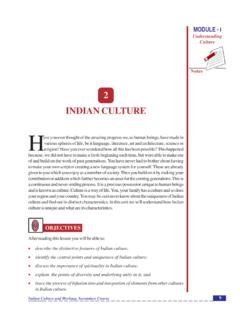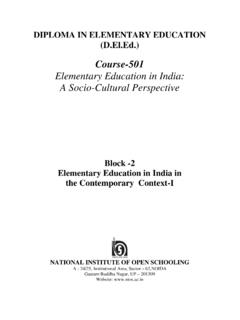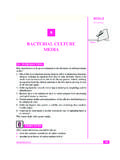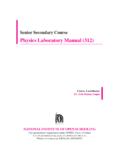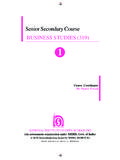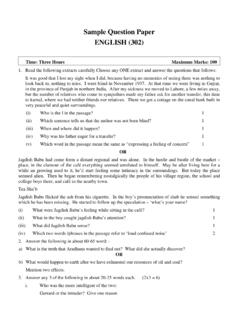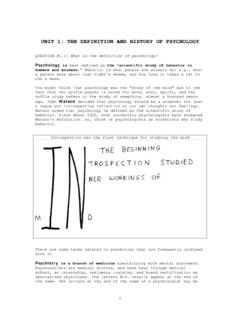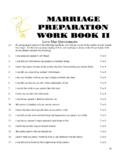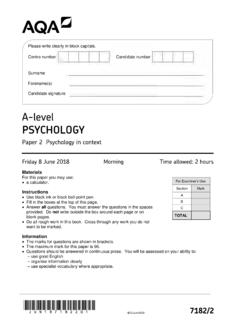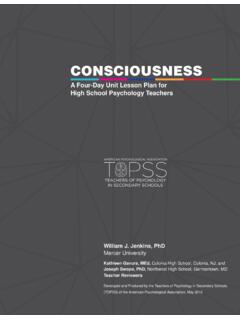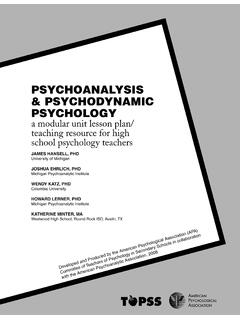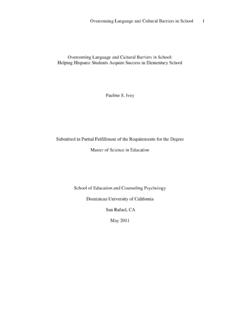Transcription of AN INTRODUCTION TO PSYCHOLOGY
1 MODULE - IFoundations ofPsychologyAn INTRODUCTION to PsychologyNotes 1 PSYCHOLOGY SECONDARY COURSE1AN INTRODUCTION TO PSYCHOLOGYAs human beings our curiosity drives us to know the reasons behind various eventshappening around us. Whenever we meet somebody or see someone doing somethingwe immediately try to understand as to why this person is doing this kind of we often try to understand our own experiences and behaviors in differentsituations. The eagerness and curiosity guide us to think as to how people are differentfrom each other in terms of their intellect, aptitude and temperament: Why do theybecome happy or sad? How do they become friendly or develop antagonisticrelationships? How do some people learn anything quickly while others take relativelymore time? The answer to all these questions may be given by a novice as well as aperson who has learned PSYCHOLOGY . The answer of the novice can be guided bycommon sense but a psychologist can study the reasons behind such activities in asystematic way and can provide scientific answers to these questions which can betested time and again.
2 In this lesson we will try to understand the nature and scope ofpsychology in detail. OBJECTIVESA fter studying this lesson, you will be able to: explain the nature of PSYCHOLOGY and its definition; describe the scope of PSYCHOLOGY ; elaborate the basic psychological processes; and explain the fields of PSYCHOLOGY . NATURE OF PSYCHOLOGY AND ITS DEFINITIONIn simple words PSYCHOLOGY is a systematic and scientific study of mental processes,experiences and behaviors - both overt and covert. The word PSYCHOLOGY has itsMODULE - IFoundations ofPsychologyPsychology Secondary CourseAn INTRODUCTION to PsychologyNotesPSYCHOLOGY SECONDARY COURSE 2origin in two Greek words psyche and logos . The word psyche in Greek languagerefers to spirit or soul and the word logos refers to discourse or study . Duringearlier times it was considered as a discipline which deals with the study of soul. InIndia the study of such questions was the main concern during Vedic and Upanishadicperiod.
3 Various aspects of mental processes were analyzed. Subsequently the schoolsof Yoga, Samkhya, Vedant, Nyaya, Buddhism, and Jainism provided detailed accountsof mind, mental processes and methods to control mind. In modern period it startedat Calcutta University in 1916 with establishment of the Department of the western world, the formal beginning of PSYCHOLOGY as an independent disciplinegoes back to 1879 when Wilhelm Wundt established the first experimental laboratoryat the University of Leipzig, in Germany. Since then the growth of PSYCHOLOGY hascovered a long journey. Today it is one of the very popular subjects among socialsciences. It studies all the shades of experiences, mental processes and comprehensive analysis of all these aspects provides a scientific understanding ofhuman nature. In the following sections we will try to understand all the componentswhich collectively define PSYCHOLOGY .
4 (A) Study of experiencePsychologists study a variety of human experiences which are mainly personal orprivate in nature. They may range from experiences of dream, conscious experiencesat different stages of life and experiences when the consciousness is altered throughmeditation or use of psychedelic drugs. The study of such experiences helps thepsychologist to understand the personal world of the individual.(B) Study of mental processesPsychology as the study of mental processes tries to investigate the activitieshappening in the brain which are primarily non physiological in nature. These mentalprocesses include perception, learning, remembering and thinking. These are internalmental activities which are not directly observed but inferred from the behaviouralactivities of the person. For example, we can say that somebody is thinking if he orshe displays certain activities related to finding solution to a mathematical problemassigned to him or her.
5 (C) Study of behaviourThe range of behaviours studied in PSYCHOLOGY is very broad. It includes simplereflexes ( eye blinking), common response patterns such as talking to friends,verbal reports about feelings and internal states and complex behaviours such ashandling computers, playing piano and addressing a crowd. These behaviours areeither observed directly through naked eyes or are measured through are generally exhibited verbally or nonverbally ( facial expression) whenan individual reacts to a stimulus in a given in PSYCHOLOGY the main unit of investigation is the individual human being andhis or her experiences, mental processes and - IFoundations ofPsychologyAn INTRODUCTION to PsychologyNotes 3 PSYCHOLOGY SECONDARY COURSEFig. : Aspects of the subject matter of PSYCHOLOGY INTEXT QUESTIONS Fill in the blanks:a. The word PSYCHOLOGY has its origin in two Greek words and.
6 B. The main unit of investigation is PSYCHOLOGY is the individual .c. Wilhelm Wundt established the first experimental at the University of Leipzig, in PSYCHOLOGY is the study of , , and . SCOPE OF PSYCHOLOGYFrom the definition of PSYCHOLOGY now it might be clear to you that psychologyaddresses a variety of issues related to mental and behavioural functioning of anindividual. Such a study helps us to develop a basic understanding about humannature and facilitates us to deal with a number of personal and social study of human beings starts with the functioning of biological systems especiallythe nervous system. Under central nervous system PSYCHOLOGY studies the functionsof various parts of brain which regulate our feelings, emotions and thinking. Withinautonomic nervous system the role of hormones and neurotransmitters in determiningour behavior is important.
7 In addition PSYCHOLOGY studies as to how a given socio-cultural environment interacts with innate biological, intellectual and social attributesof the child and facilitates healthy development of the processesExperienceBehaviourMODULE - IFoundations ofPsychologyPsychology Secondary CourseAn INTRODUCTION to PsychologyNotesPSYCHOLOGY SECONDARY COURSE 4As a living organism you encounter a lot of sensory input every moment. Your taskis not only to process that information but to store and retrieve it when it is requiredto be used. Attention and perception help to process information. Memory helps usto register, retain and retrieve information, and thinking provides us the ability tomanipulate and improve the stored information. Within PSYCHOLOGY , all these arestudied under the domain of higher mental processes or your life you must have come across many persons who have reached highestlevel of accomplishment.
8 But such an accomplishment is not attained at once; it isthe result of continuous learning in which the individual acquires the necessary skillsand competencies through regular practice. PSYCHOLOGY helps us to understand theprocesses involved in reaching this high level of order to understand the purpose behind any kind of behaviour psychologists usethe concept of motivation. It primarily focuses on the investment of mental energyand consistency of effort towards achieving the set goals. The various shades offeelings such as anger, fear, love, joy, and sadness which we experience during thecourse of our life are studied within the realm of will certainly agree that no two individuals are the same in terms of their physicalattributes such as height, weight, skin colour or facial features as well as psychologicalattributes such as intelligence, personality, temperament and interest.
9 Anunderstanding of these and other aspects of individual differences facilitates thepsychologist to select right person for the right job and to provide guidance andcounseling for various matters of personal as well as professional concern. Theunderstanding of individual differences also helps the psychologist to differentiatebetween normative (customary, accepted) and abnormal (deviant, unusual) PSYCHOLOGY as a discipline has a vast scope. It not only studies human beingsacross the life span but also tries to explore mental processes and potentials in orderto facilitate achieving a better quality of 1 The Power of Positive Thinking: Health and HappinessBy thinking and saying positive thoughts to yourself and others, you can graduallycreate a positive change in yourself as well as in others. Try this exercise withyour friends or family members. Ask your friends as to how many of them are ina positive mood and how many in a negative mood.
10 Then instruct your friendsto shake hands with others and genuinely say I wish you happiness and goodhealth . Again ask your friends about their mood, to see how many report positive and how many negative . Yes, you will be surprised - the number of reported positive moods has gone - IFoundations ofPsychologyAn INTRODUCTION to PsychologyNotes 5 PSYCHOLOGY SECONDARY COURSE BASIC PSYCHOLOGICAL PROCESSESW hile studying behaviour it is one of the most important tasks for psychologists tounderstand the processes which collectively influence a particular behaviour. Thesepsychological processes are(A) Sensation: It refers to our awareness about various stimuli which we encounterin different modalities such as vision, hearing, touch and taste.(B) Attention: During attention we selectively focus on a particular stimulus amongmany stimuli available to us. For instance while listening to a lecture in theclassroom we attend to the words pronounced by the teacher and, try to ignorethe other stimuli present in the classroom, such as noise made by the fan.

